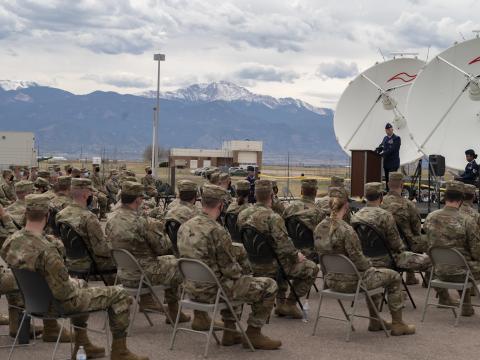Program Facilitates Transition to Private Sector
The Northern Virginia Chapter’s (NOVA) Successfully Transitioning from Active to Retired (STAR) program eases the move to private-sector employment by disseminating valuable information to military and government retirees. Founded in 2007, the program offers seminars that supplement the information government transition assistance programs provide.
STAR program events are held before and after traditional work-day hours to enable retiring uniformed military and government employees to network with potential employers and other retirees. They also can ask questions about the transition process; obtain referrals, advice and résumé reviews; and participate in discussions relevant to the transition process.
Kathleen Smith and Col. Kevin Hoey, USMC (Ret.), founded the program during Col. Hoey’s term as NOVA chapter president. He continues to serve on the program’s board to recruit new speakers and as master of ceremonies for the seminars.
Col. Hoey believes his own experience transitioning from the military to the private sector helped him improve on the existing programs. “During my transition process, I sat through a number of lectures and workshops. What was missing was an interactive format focused on developing networking skills,” he says.
Smith agrees. “The purpose of the program is to highlight that networking is a key component to the transition process and that the chapter is a great place to start and continue that networking,” she shares.
The STAR program typically features two seminars in the fall and three in the spring annually. The events usually are breakfasts or dinners that include networking, panel presentations, question-and-answer sessions and discussions that occur during the meal. A chapter member sits at each table to help guide the conversations. The people at each table then are asked to share their top discussion points.
In the days after the event, panelists, sponsors and chapter members continue to engage with the participants, providing résumé reviews, referrals and individual advice. Smith notes that participants often attend multiple events because they learn new information each time.
“Transitioning is a difficult step for many, and it is always beneficial to have a strong network to assist you through the process. Many military and government members who are transitioning have not had the opportunity to develop personal networking skills,” Col. Hoey states. The program keeps attendance to less than 75 participants so that the event can be more personalized.
Smith believes the program’s focus on sharing experiences and facilitating discussions is particularly successful. “The speakers share their real-life experiences, which shows the audience that everything is possible and that networking is a continuous process,” she says.
Panel members typically are recently retired members from each service branch in addition to newly retired government workers. “We try to find speakers who have achieved their goals after leaving government or military service,” Col. Hoey explains. “We ask them to relate their experiences—the positive, the negative, what they did right and what they would do differently,” he continues.
The STAR program is open to chapter as well as nonchapter members in government or military. Although the program has helped to increase chapter membership, “that is not the goal of the program,” Smith emphasizes.
Registration fees typically are around $15. Col. Hoey notes that costs are kept to a minimum to make the event accessible to a wide range of interested parties.
The next STAR event is scheduled for April 22. Registration information and more details are available at the chapter’s Web site.
Visit Member Services' Region and Chapter Information page to read about other noteworthy chapter events.



